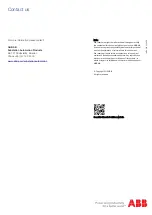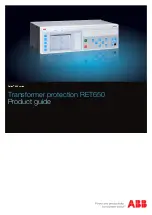
is really closed when the test-plug handle has been removed by using a high-ohmic
voltmeter and measuring between the plus and the trip output on the panel. The
measurement is then done through the trip coil of the circuit breaker and therefore the
complete trip circuit is checked.
Note that the breaker must be closed.
Please observe that the test system does not provide built-in security
during this test. If the instrument should be set on Amp instead of
Volts, the circuit breaker naturally is tripped, therefore, great care is
necessary.
Trip circuit from trip IEDs to circuit breaker is often supervised by trip-circuit
supervision. It can then be checked that a circuit is healthy by opening tripping output
terminals in the cubicle. When the terminal is opened, an alarm shall be achieved on
the signal system after a delay of some seconds.
Remember to close the circuit directly after the test and tighten the
terminal carefully.
12.2.2.7
Measurement of service currents
After a maintenance test it is recommended to measure the service currents and service
voltages recorded by the protection IED. The service values are checked on the local
HMI or in PCM600. Ensure that the correct values and angles between voltages and
currents are recorded. Also check the direction of directional functions such as
Distance and directional overcurrent functions.
For transformer differential protection, the achieved differential current value is
dependent on the tap changer position and can vary between less than 1% up to
perhaps 10% of rated current. For line differential functions, the capacitive charging
currents can normally be recorded as a differential current.
The zero-sequence current to earth-fault protection IEDs should be measured. The
current amounts normally very small but normally it is possible to see if the current
circuit is "alive".
The neutral-point voltage to an earth-fault protection IED is checked. The voltage is
normally 0.1 to 1V secondary. However, voltage can be considerably higher due to
harmonics. Normally a CVT secondary can have around 2.5 - 3% third-harmonic
voltage.
Section 12
1MRK 506 355-UEN A
Commissioning and maintenance of the fault clearing system
252
Line distance protection REL670 2.1 IEC
Commissioning manual
Summary of Contents for Relion 670 Series REL670
Page 1: ...Relion 670 series Line distance protection REL670 2 1 IEC Commissioning manual ...
Page 2: ......
Page 30: ...24 ...
Page 34: ...28 ...
Page 64: ...58 ...
Page 68: ...62 ...
Page 90: ...84 ...
Page 254: ...248 ...
Page 260: ...254 ...
Page 269: ...263 ...













































